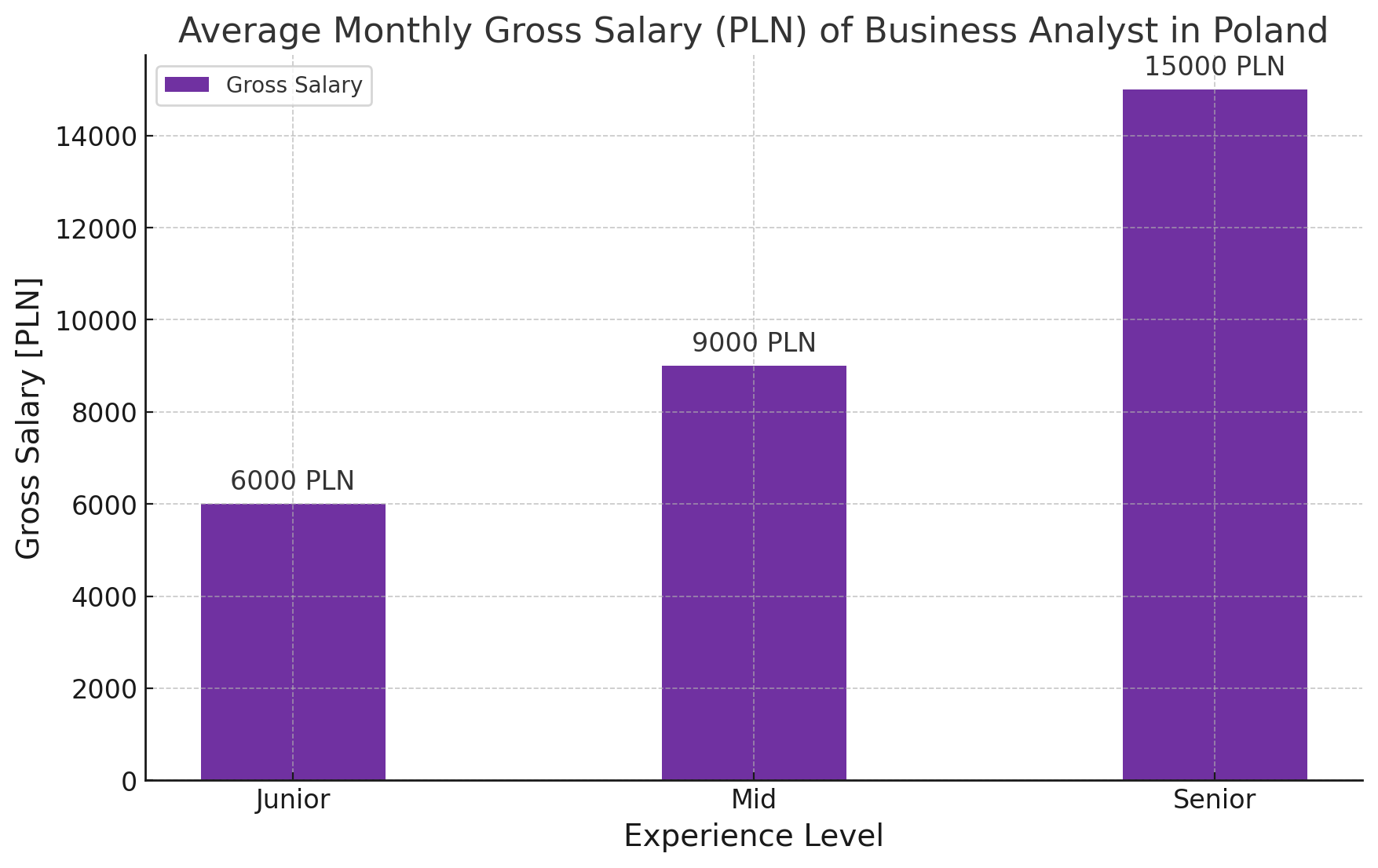Business Analyst. Salaries, Responsibilities
A Business Analyst is one of the key professions in today's business world, where a dynamic work environment demands continuous improvement of processes and strategies within an organization. Their role involves combining knowledge in management, finance, and IT, making them an incredibly versatile specialist. In this article, you'll learn about the salary a Business Analyst can earn and the responsibilities they face daily.
Business Analyst. How much do they earn?
The salary of a Business Analyst depends on various factors such as experience, location, the size of the company, the sector in which they operate, and the specific nature of the position.
The average salary for a Business Analyst in Poland ranges from 6,000 to 12,000 PLN gross per month. Junior specialists, who are just starting their careers, can expect a salary of around 5,000 to 7,000 PLN gross. On the other hand, experienced analysts, who have a rich portfolio of projects and a high level of competence, often earn over 15,000 PLN gross per month.
For example, according to the Antal Salary Report 2024, the average gross monthly salary for Business Analysts with foreign language skills in the banking sector within SSC/BPO ranges from 10,500 to 16,000 PLN.

It is also worth noting the additional benefits that often accompany the salaries of Business Analysts. These include private medical care, sports cards, opportunities for remote work, and budgets for training and personal development. In international companies, analysts can also expect annual bonuses, which can significantly increase their total earnings.
What are the responsibilities of a Business Analyst?
The role of a Business Analyst is highly diverse and encompasses a wide range of responsibilities, which vary depending on the sector and the specific organization. However, several key tasks are common to most Business Analysts.
- Business Needs Analysis
One of the most important responsibilities of a Business Analyst is to understand and analyze the business needs of an organization. In practice, this involves conducting detailed interviews with stakeholders, gathering requirements, and documenting them. Based on this information, the analyst can identify areas that need improvement and propose appropriate solutions.
- Creating Project Documentation
A Business Analyst is also responsible for creating project documentation that serves as a guide for IT teams and other departments involved in the project. This documentation includes detailed descriptions of requirements, functional specifications, and business process diagrams. This ensures that all team members clearly understand the requirements, avoiding misunderstandings during project execution.
- Collaboration with IT Teams
The Business Analyst acts as a bridge between the business department and IT teams. In practice, this means close collaboration with developers, testers, and system architects. The analyst ensures that technical solutions align with business requirements and that the process of implementing new systems proceeds smoothly and efficiently.
- Participation in Testing and Implementations
During the project execution, the Business Analyst often participates in the testing and implementation of new solutions. Their task is to verify that the delivered solutions meet business requirements and are consistent with previous agreements. If any errors or discrepancies are found, the analyst is responsible for reporting issues and working with the IT team to resolve them.
- Monitoring the Effectiveness of Solutions
After new systems and processes are implemented, the Business Analyst monitors their effectiveness and analyzes whether they deliver the expected benefits. If the implemented solutions do not meet expectations, the analyst may propose additional improvements or modifications to achieve the desired business goals.
- Training and User Support
Another task of the Business Analyst is organizing training for end users and providing them with support while using new systems. The analyst ensures that all employees are properly trained and can effectively use the introduced tools. This allows the full potential of the new solutions to be realized and helps avoid problems related to their use.
- Continuous Improvement of Business Processes
In a dynamically changing business environment, the role of the Business Analyst does not end with the implementation of new solutions. They are also responsible for the continuous improvement of business processes, identifying new opportunities, and introducing innovations that contribute to increasing the organization's competitiveness in the market.
A Business Analyst is a profession that requires a broad knowledge base and analytical skills, which are essential for effective project management and the implementation of new solutions. The salary for this position is highly competitive, especially for those with experience and the right competencies. This profession also offers the opportunity for continuous development and participation in projects that have a real impact on the organization's operations. Therefore, a Business Analyst is a profession of the future, which will attract increasing interest in the job market.













